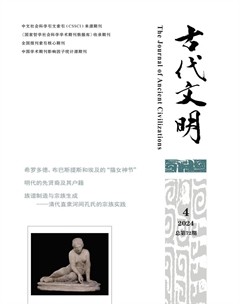[Ancient Mediterranean Civilizations]
Title: Herodotus, Bubastis, and Festival of Bastet in Ancient Egypt………………………………………………/3
Author: Wang Yixin, Professor, Faculty of History, Nankai University, Tianjin, 300350, China.
Abstract: Greek historian Herodotus once traveled to the Nile Delta in Egypt for historical remains and folk
customs. Among his “Egyptian Stories", the accounts dealing with the city of Bubastis and the cult of the cat goddess Bastet have attracted serious academic attention concerning their reliability. This article first conducts a textual analysis of Herodotus' accounts, and then traces the archaeological finds in Bubastis. On this basis, the article analyzes the reliability of Herodotus’ accounts as well as their historical value. By conclusion, the article points out that although Herodotus's "Egyptian Stories" contain many absurd and incredible contents, his accounts about Bubastis and the cult of the Bastet were mainly based upon eye-witness information or other types of reliable sources. The reliability of those texts has been confirmed by archaeological and scientific investigations and supported by ancient Egyptian texts and iconography.
Key words: Herodotus; Bubastis; Bastet; the Festival of Bastet
Title: The Scrutiny of Magistrates and Athenian Democracy: A Reconsideration of the Arginusae Trial……/15
Author: Xu Lang, Postdoctoral Researcher, Faculty of History, Nankai University, Tianjin, 300350, China.
Abstract: The Arginusae Trial has been long criticized for its illegal procedures, and Theramenes is often considered as the man who was responsible for the unjust execution of the six generals. However, textual analysis suggests that the trial was not entirely a result of emotional impulsiveness, but rather an exercise of magistrate supervision. As an Athenian citizen, a colleague of the executed generals, and a participant of the war, Theramenes played an active role in monitoring the behavior of those generals. The outcome of the Arginusae Trial reveals that relying on citizens to supervise officials could be problematical because the citizens were easy to be misled by somebody. Nonetheless, citizen involvement in overseeing officials is still important for democracy and the rule of law.
Key words: Athens; Generals; Scrutiny of Magistrates; Arginusae Trial
[Byzantine and the European Middle Ages: Carolingian Dynasty Column]
Title: Charlemagne’s Testament………………………………………………………………………………/27
Author: Liu Yin, Associate Professor, Department of History, Zhejiang University, Hangzhou, Zhejiang, 310058,China.
Abstract: Einhard records the testament of Charlemagne in the final section of his Life of Charlemagne. The Frankish political assembly in the spring or summer of 811 was the most possible occasion in which the will was made. In his old age, Charlemagne chose to dispose all his properties to settle the familial issues as well as the imperial order. The context of this testament revels clues about the complicated problems facing the empire in 811 concerning politics, relationship with the church, diplomacy, natural disaster, and moral improvement.
Key words: Charlemagne; Carolingian; testament
Title: On the Battle of Fontenoy………………………………………………………………………………/37
Author: Wang Jinxin, Professor, School of History and Culture, Northeast Normal University, Changchun, Jilin,130024, China.
Abstract: The Battle of Fontenoy is a massive decisive battle with significant influences during the Carolingian civil war in the mid-ninth century. A critical analysis of this battle from aspects such as the Carolingian inheritance system, Louis the Pious’ political arrangements for his successors, and the contradictions among his successors may lead to better understanding of the background, nature, and process of this battle. Because historians of the ninth century and scholars of around the eighteenth century have made some arbitrary comments on this battle, a reexamination of the historical materials about this battle would help to deepen the understanding of the political and social situation of the Carolingian Empire during the ninth century.
Key words: Fontenoy; Lothair; Louis the German; Charles the Bald
Title: The Piety of Louis the Pious: An Examination from Academic History Point of View………………/50
Author: Li Longguo, Associate Professor, Department of History, Peking University, Beijing, 100871, China.
Abstract: The relationship between the Church and the state was a central issue in the Middle Ages. Louis the Pious, as his nickname suggests, exemplifies the complex interplay between these two forces, illustrating both cooperation and conflict in medieval politics. This is why his reputation has fluctuated with shifts in historio







